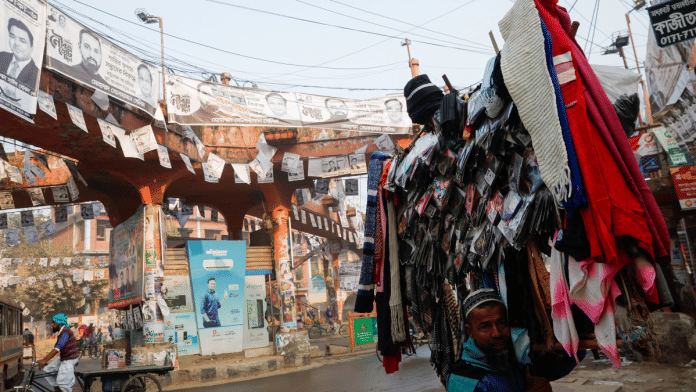Dhaka: Inside a small office in a nondescript building in the plush Gulshan-1 neighbourhood, the 61-year-old editor of Blitz magazine Salah Uddin Shoaib Choudhury says Sunday’s national polls in Bangladesh will be a war. “It will be a war between Caliphate mongers on the one hand and secularists and pseudo secularists on the other.”
Choudhury finds both sets problematic. “Most people in this country are radicals,” he sighs. “No matter which political grouping they stand with. It is only a matter of degree.”
The senior journalist shrugs off the narrative put out by most opinion writers in the Western press that the 12th general elections are rigged in favour of PM Sheikh Hasina and that democracy is dying a slow death in Bangladesh.
For Chowdhury, a country is batting for the inclusion of undemocratic forces in the democratic process. “Hasina must come back to power. This country has no other alternative for now if it wants growth and relative stability,” he tells ThePrint.
He cites Friday night’s train burning incident inside Dhaka where five people were charred to death and the arson attack on a Buddhist temple in Cox’s Bazar.
Nabiullah Nabi, a leader of the principal opposition Bangladesh Nationalist Party (BNP), was arrested for his alleged role in setting fire to the Benapole Express. Bangladeshi news channel RTV put out footage showing a BNP worker swearing on the Quran and claiming that the train burning was planned in a BNP video conferencing meeting.
The BNP has boycotted the election and its former ally, the Jamaat-e-Islami, the largest Islamist party in the country, barred by the courts from the elections, making many political observers within and outside Bangladesh wonder if there is a need for an election at all Sunday since Sheikh Hasina is certain to return for a historic fourth straight term in office.
Also Read: Molotov cocktails hurled at polling booths, BNP workers clash with cops as Bangladesh heads to polls
The discontent with continuity
Artiste and café owner Afreen Rashid Konika (name changed on request), who divides her time between Bangladesh and Australia, as she holds a dual citizenship, says Sunday polls makes her yawn. She is undecided yet whether to go out to vote.
“What is the point anyway? Hasina is coming back unchallenged. The ruling party talks about Smart Bangladesh. What about the garment workers who are protesting over low wages? Or, the arrest of almost 20,000 opposition leaders and workers? Or, high inflation?” she asks.
Konika’s discontent with the Hasina government is not hers alone. A chunk of civil society that is often not vocal about its sentiments, the Western press, and the American establishment that has put pressure on Hasina to conduct free and fair elections, point to the muzzling of free speech, violent crackdown on the opposition and its shrinking space in the country. Not to mention the allegations of opposition parties themselves.
As Dhaka wore a half-deserted look on Saturday with many residents opting to stay indoors after Friday night’s violence, Sanjay Datta (name changed), a Dhaka-based senior journalist, told ThePrint that the fear and loathing is more for minorities.
“Every election in Bangladesh, minorities bear the brunt. The situation is such that we have no one to turn to except the Awami League. But who will ask the question why Awami League has not been able to stem the communal rot that has pervaded the Bangladeshi society?” Datta asks.
In a scathing article titled ‘A dummy-cratic election in democratic Bangladesh’, the Daily Star wrote on Friday: “We have witnessed 11 national elections in the last 52 years, but never have we seen an election where the contest is between ami (me) and the “dummy.” One quip making the rounds is that the one of January 7 will be a “dummy-cratic” election. When do people resort to satire? When they can neither accept the reality, nor resist or change it. So, for the common people, this election has become a satirical election.”
Bangladesh is now officially a one-party state, Datta says. “Whatever Hasina wants will happen. If she wants minorities to be safe, they will be safe. If she doesn’t, we won’t be.”
If not Hasina, who else?
Inside the Sheikh Hasina National Institute of Burn & Plastic Surgery in Dhaka, 30-year-old Runa Khan is getting treated for her burnt back. A victim of an arson attack on a bus during a BNP-Jammat protest against the Sheikh Hasina government, she has been in the hospital since.
“I stay up nights in agonising pain,” Khan tells ThePrint. “I ask the Opposition why me? Why should I be the victim of your hate for Hasina?”
Khan wants to go back to her family as soon as possible and wants the election violence to end. “Pre-decided or not, the elections should be held.”
Political analyst Sahidul Hasan Khokon says the question that everyone needs to ask is if not Hasina, what? “We can argue endlessly about the nature of the Sunday elections. The point is only people who have a skin in the game know that if not Hasina, there is an abyss. Such is the political scenario in the country today that if she goes, Bangladesh will slip into anarchy. We have seen what happens to Bangladesh when BNP-Jamaat comes to power,” the political analyst asserts.
(Edited by Tony Rai)
Also Read: King parties, fugitive prince, comeback queen—is 2024 Bangladesh election rigged?






